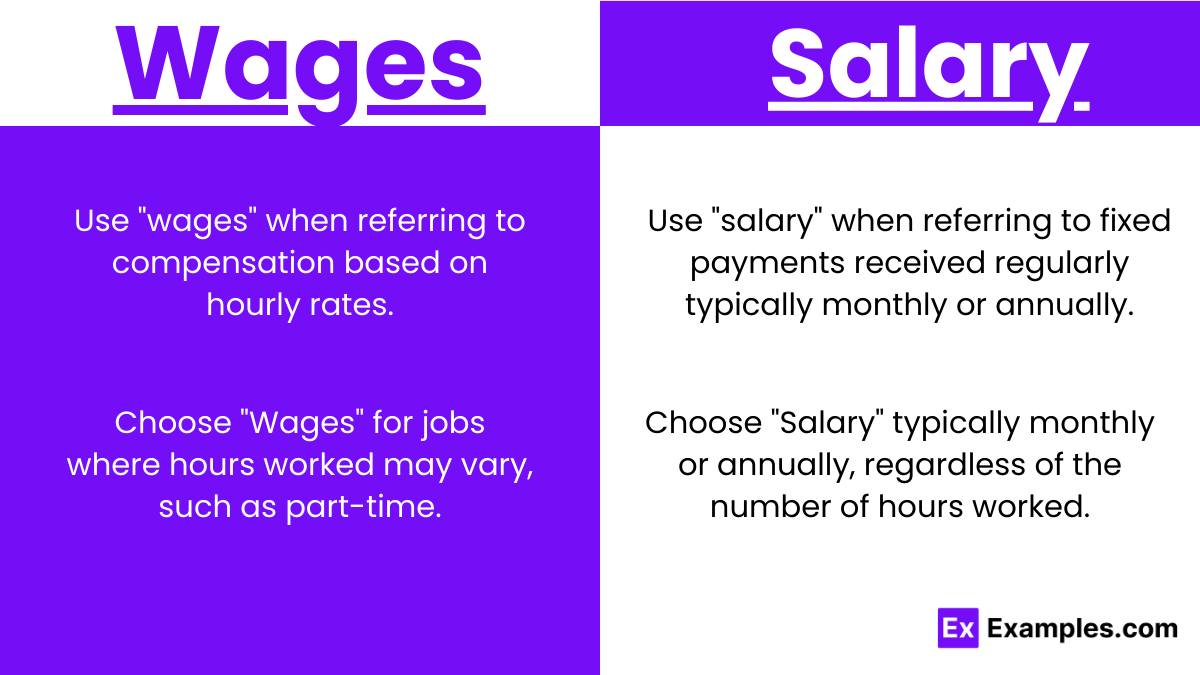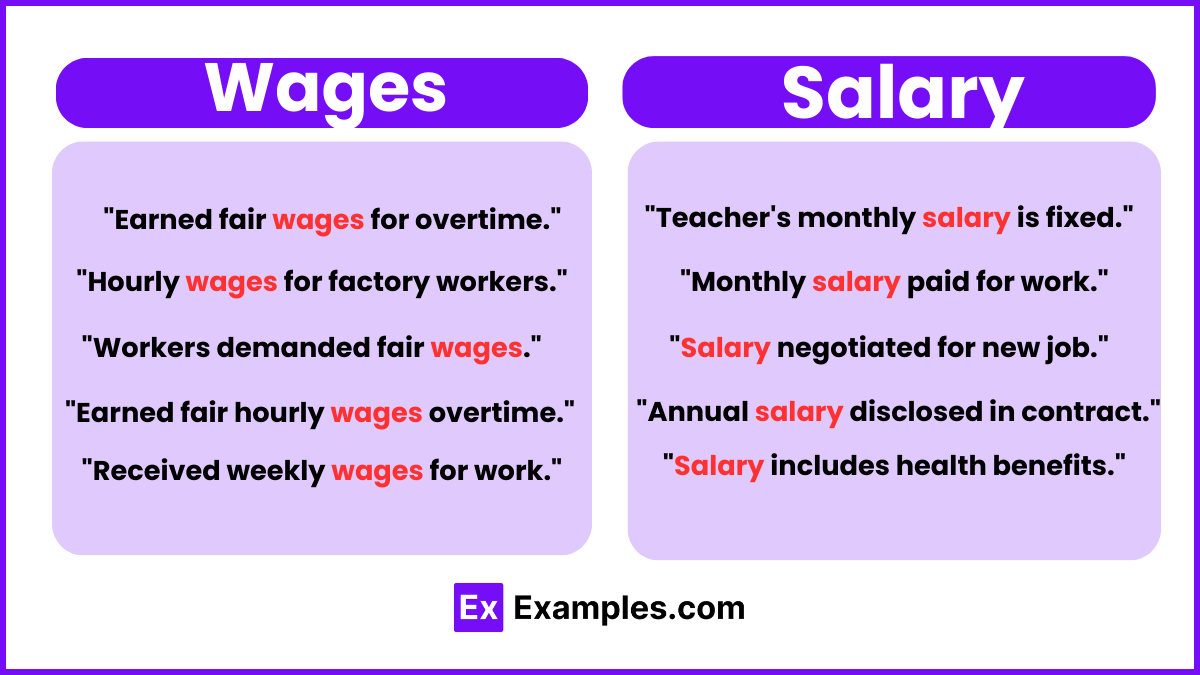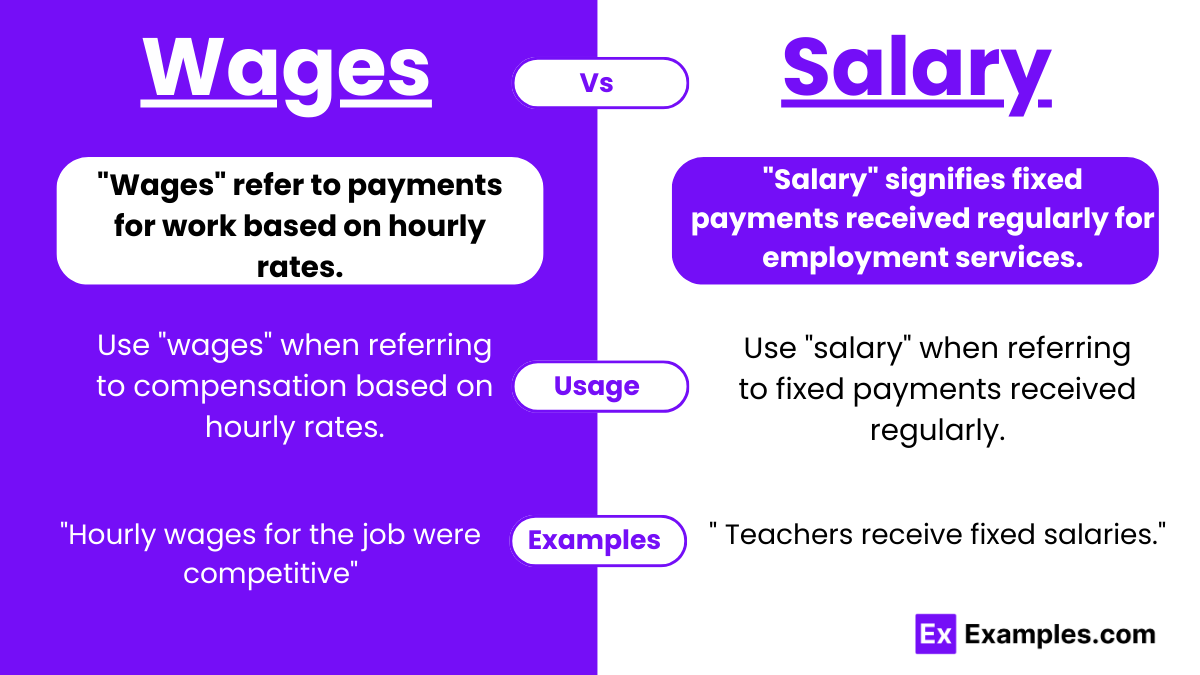Wages vs Salary – Meanings, Differences, Usage, Examples, Tricks
Embark on a journey through the intricacies of wages and salary, where financial transactions meet effective communication. Uncover examples, nuances, and practical insights to navigate the realm of income with clarity and confidence. Whether deciphering pay structures or negotiating compensation, mastering this aspect of financial communication is key to achieving fiscal success and stability in today’s dynamic economy.
Wages vs Salary– Meanings
Wages: “Wages” refer to payments made to workers based on an hourly rate for the hours worked. This compensation method is common for jobs in industries like retail, hospitality, and construction, where hours worked may vary from week to week.
Salary: “Salary” is a fixed payment given to employees on a regular basis, usually monthly or annually, regardless of the number of hours worked. Salaried positions are often associated with professional or managerial roles, providing stability and predictability in income.
Summary
How To Pronounce Wages and Salary
How to Pronounce “Wages”:
- Pronunciation: /ˈweɪdʒɪz/
- Breakdown:
- Stress: The stress is on the first syllable, “wayj-iz.”
- Example Sentence: “Her wages increased after the promotion.”
- Start with the “way” sound, similar to “weigh.”
- Followed by the “juh” sound, similar to “judge.”
- End with the “z” sound, similar to “zoo.”
How to Pronounce “Salary”:
- Pronunciation: /ˈsæləri/
- Breakdown:
- Stress: The stress is on the first syllable, “sal-uh-ree.”
- Example Sentence: “He received a high salary for his expertise.”
- Start with the “sal” sound, similar to “salad.”
- Followed by the “uh” sound, similar to “up.”
- End with the “ree” sound, similar to “reel.”
Differences Between Wages and Salary
| Aspect | Wages | Salary |
|---|---|---|
| Payment Method | Hourly basis | Fixed basis |
| Calculation | Based on hours worked | Fixed amount regardless of hours worked |
| Frequency | Typically paid weekly or bi-weekly | Usually paid monthly or annually |
| Variability | Can vary depending on hours worked | Consistent and predictable |
| Common Jobs | Hourly or part-time roles in certain industries | Professional or managerial positions |
How To Remember The Tricks Between Wages and Salary
Tricks To Remember The Differences Between Wages and Salary:
Payment Structure:
- Visualize “wages” as “watching the clock,” implying payment based on hourly rates.
- Picture “salary” as a “set” amount received regularly, resembling a fixed salary.
Frequency Reminder:
- Memorize “Wages Weekly” to recall that wages are typically paid weekly or bi-weekly.
- Associate “salary” with “Salaried,” indicating monthly or annual payments.
Income Stability:
- Think of “wages” as “wavy,” suggesting variability based on hours worked.
- Envision “salary” as “steady,” representing consistent and predictable payments.
Job Type Association:
- Connect “wages” with hourly or part-time roles, such as those in retail or hospitality.
- Link “salary” with professional or managerial positions, symbolizing fixed incomes.
When to Use Wages and Salary

When to Use Wages:
Use “wages” when referring to compensation based on hourly rates, typically for jobs where hours worked may vary, such as part-time or hourly positions.
When to Use Salary:
Use “salary” when referring to fixed payments received regularly, typically monthly or annually, regardless of the number of hours worked, common for professional or managerial positions.
Wages and Salary Examples

Wages Examples:
- She earns hourly wages working at the restaurant.
- His wages increased after receiving a promotion.
- They received their weekly wages for their part-time jobs.
- The workers negotiated higher wages with the company.
- The hourly wages for the job were competitive in the market.
Salary Examples:
- He received a generous monthly salary as a manager.
- She negotiated her annual salary before accepting the job offer.
- The CEO’s annual salary was publicly disclosed.
- Teachers receive a fixed salary regardless of hours worked.
- His yearly salary includes performance bonuses and benefits.
Synonyms For Wages and Salary
| Synonyms for “Wages” | Synonyms for “Salary” |
|---|---|
| Earnings | Income |
| Compensation | Pay |
| Remuneration | Compensation |
| Hourly pay | Fixed income |
| Hourly wage | Monthly payment |
Exercise
Instructions: Fill in the blanks with the appropriate word, “wages” or “salary,” to complete each sentence correctly.
- She earns a monthly _______________ as a teacher.
- They negotiated higher _______________ with their employer.
- His hourly _______________ were increased after the union negotiations.
- The company pays competitive _______________ to its employees.
- The _______________ for the job is $50 per hour.
Answers:
- salary
- wages
- wages
- wages
- wage
FAQ’S
Is it better to be on salary or hourly wage?
The preference between salary and hourly wage depends on individual circumstances. Salary offers stability and benefits, while hourly wage provides flexibility but may lack consistent income.
Is a salary monthly or yearly?
A salary can be paid monthly or yearly, depending on the terms of employment. It is a fixed amount paid at regular intervals, typically monthly or annually.
Why do companies pay hourly instead of salary?
Companies may pay hourly wages instead of salary to accommodate fluctuating workloads, ensure fair compensation for hours worked, manage costs efficiently, and comply with labor regulations regarding overtime and part-time employment.
What salary is a good salary?
A good salary is subjective and depends on factors such as cost of living, job market, individual needs, and lifestyle. Generally, it provides financial stability and meets personal and financial goals.
Wages vs Salary – Meanings, Differences, Usage, Examples, Tricks

Embark on a journey through the intricacies of wages and salary, where financial transactions meet effective communication. Uncover examples, nuances, and practical insights to navigate the realm of income with clarity and confidence. Whether deciphering pay structures or negotiating compensation, mastering this aspect of financial communication is key to achieving fiscal success and stability in today’s dynamic economy.
Wages vs Salary– Meanings
Wages: “Wages” refer to payments made to workers based on an hourly rate for the hours worked. This compensation method is common for jobs in industries like retail, hospitality, and construction, where hours worked may vary from week to week.
Salary: “Salary” is a fixed payment given to employees on a regular basis, usually monthly or annually, regardless of the number of hours worked. Salaried positions are often associated with professional or managerial roles, providing stability and predictability in income.
Summary
In the context of employment, Wages are payments based on hourly rates for hours worked, typical in industries like retail and construction. Conversely, Salary denotes fixed payments given regularly, regardless of hours worked, commonly associated with professional or managerial roles. Wages offer flexibility but fluctuate with hours, while salaries provide stability and predictability in income, distinguishing the compensation structures for different types of employment arrangements.
How To Pronounce Wages and Salary
How to Pronounce “Wages”:
Pronunciation: /ˈweɪdʒɪz/
Breakdown:
Stress: The stress is on the first syllable, “wayj-iz.”
Example Sentence: “Her wages increased after the promotion.”
Start with the “way” sound, similar to “weigh.”
Followed by the “juh” sound, similar to “judge.”
End with the “z” sound, similar to “zoo.”
How to Pronounce “Salary”:
Pronunciation: /ˈsæləri/
Breakdown:
Stress: The stress is on the first syllable, “sal-uh-ree.”
Example Sentence: “He received a high salary for his expertise.”
Start with the “sal” sound, similar to “salad.”
Followed by the “uh” sound, similar to “up.”
End with the “ree” sound, similar to “reel.”
Differences Between Wages and Salary
Aspect | Wages | Salary |
|---|---|---|
Payment Method | Hourly basis | Fixed basis |
Calculation | Based on hours worked | Fixed amount regardless of hours worked |
Frequency | Typically paid weekly or bi-weekly | Usually paid monthly or annually |
Variability | Can vary depending on hours worked | Consistent and predictable |
Common Jobs | Hourly or part-time roles in certain industries | Professional or managerial positions |
How To Remember The Tricks Between Wages and Salary
Tricks To Remember The Differences Between Wages and Salary:
Payment Structure:
Visualize “wages” as “watching the clock,” implying payment based on hourly rates.
Picture “salary” as a “set” amount received regularly, resembling a fixed salary.
Frequency Reminder:
Memorize “Wages Weekly” to recall that wages are typically paid weekly or bi-weekly.
Associate “salary” with “Salaried,” indicating monthly or annual payments.
Income Stability:
Think of “wages” as “wavy,” suggesting variability based on hours worked.
Envision “salary” as “steady,” representing consistent and predictable payments.
Job Type Association:
Connect “wages” with hourly or part-time roles, such as those in retail or hospitality.
Link “salary” with professional or managerial positions, symbolizing fixed incomes.
When to Use Wages and Salary
When to Use Wages:
Use “wages” when referring to compensation based on hourly rates, typically for jobs where hours worked may vary, such as part-time or hourly positions.
When to Use Salary:
Use “salary” when referring to fixed payments received regularly, typically monthly or annually, regardless of the number of hours worked, common for professional or managerial positions.
Wages and Salary Examples
Wages Examples:
She earns hourly wages working at the restaurant.
His wages increased after receiving a promotion.
They received their weekly wages for their part-time jobs.
The workers negotiated higher wages with the company.
The hourly wages for the job were competitive in the market.
Salary Examples:
He received a generous monthly salary as a manager.
She negotiated her annual salary before accepting the job offer.
The CEO’s annual salary was publicly disclosed.
Teachers receive a fixed salary regardless of hours worked.
His yearly salary includes performance bonuses and benefits.
Synonyms For Wages and Salary
Synonyms for “Wages” | Synonyms for “Salary” |
|---|---|
Earnings | Income |
Compensation | Pay |
Remuneration | Compensation |
Hourly pay | Fixed income |
Hourly wage | Monthly payment |
Exercise
Instructions: Fill in the blanks with the appropriate word, “wages” or “salary,” to complete each sentence correctly.
She earns a monthly _______________ as a teacher.
They negotiated higher _______________ with their employer.
His hourly _______________ were increased after the union negotiations.
The company pays competitive _______________ to its employees.
The _______________ for the job is $50 per hour.
Answers:
salary
wages
wages
wages
wage
FAQ’S
Is it better to be on salary or hourly wage?
The preference between salary and hourly wage depends on individual circumstances. Salary offers stability and benefits, while hourly wage provides flexibility but may lack consistent income.
Is a salary monthly or yearly?
A salary can be paid monthly or yearly, depending on the terms of employment. It is a fixed amount paid at regular intervals, typically monthly or annually.
Why do companies pay hourly instead of salary?
Companies may pay hourly wages instead of salary to accommodate fluctuating workloads, ensure fair compensation for hours worked, manage costs efficiently, and comply with labor regulations regarding overtime and part-time employment.
What salary is a good salary?
A good salary is subjective and depends on factors such as cost of living, job market, individual needs, and lifestyle. Generally, it provides financial stability and meets personal and financial goals.

